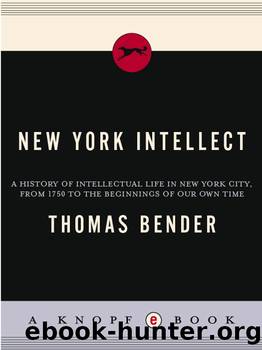NEW YORK INTELLECT by Thomas Bender

Author:Thomas Bender [Bender, Thomas]
Language: eng
Format: epub
ISBN: 978-0-307-83152-1
Publisher: Knopf Doubleday Publishing Group
Published: 2013-01-16T00:00:00+00:00
Brace had come to New York to study theology at Union Theological Seminary, with the intention of a career of writing and preaching. But compared to the life of the cityâthe âflood of humanityâ that âsweeps alongâ Broadwayâtheology seemed tame and ineffectual.111 His disillusionment with cloistered intellect was advanced when he spent the winter of 1850â51 in Berlin. There he came to appreciate American practicality, finding the âliterary classâ of Berlin highly cultivated but preoccupied with âa sort of vapor with shadows on itâ rather than with the âsolidity and stuffâ of life. He returned to New York having decided to undertake âsome course of work for the unfortunate in our city.â112
Brace became associated with various philanthropic groups in the city, while continuing to pursue his studies and his literary work. As a student at Yale a few years before, he had worried that his âheart is wrong and my tastes are all set against sympathizing with the low and vulgar.â He had so little âpractical knowledgeâ that he thought he would have no skill for associating with âmen of the lower class.â Once in New York, however, he seems to have developed a genuine sympathy for poor people. He was particularly moved by an experience in 1849, when he preached one Sunday in the Almshouse Chapel on Blackwells Island to an audience of paupers, vagrants, and âdiseased prostitutes.â It was, he wrote to his father, âone of the most exciting and interesting days I ever spent.â It moved him deeply; ânever had my whole nature so stirred up within me.â113
Still, if Brace had pretty much decided to devote himself to helping the poor and unfortunate, it was not yet clear that practical philanthropy, rather than literature, would become his vehicle. In 1852, after the success of Harriet Beecher Stoweâs Uncle Tomâs Cabin, he dreamed of writing a âgrand workâ of literature that would âdo for the mechanicsâ what Stowe had done for the slaves.114 Within a year, however, he and a group of philanthropic New Yorkers had organized the Childrenâs Aid Society. He anticipated that after a year or so he would move on to âsome wider and more intellectual field,â but in fact he stayed with it for forty years, continuing always to write and using his literary connections, as did Olmsted in respect to the park, to advance the interest of the Childrenâs Aid Society.115 Indeed, working at the intersection of literary life and practical reform allowed or enabled Brace to become, in the words of Paul Boyer, âan incisive, original social thinker,â a genuinely âinnovative force in urban moral reform.â116
What remains most vital in Braceâs thought and work is his articulation of an alternative to institutional care for deviant and dependent children, an idea thatâbecause of himâwas identified specifically with New York City in the nineteenth century.§ Here I want to explore his sense of the city as a place of rich and poor, a place where, in his view, a shared moral, if not learned, culture was possible.
Download
This site does not store any files on its server. We only index and link to content provided by other sites. Please contact the content providers to delete copyright contents if any and email us, we'll remove relevant links or contents immediately.
| Africa | Americas |
| Arctic & Antarctica | Asia |
| Australia & Oceania | Europe |
| Middle East | Russia |
| United States | World |
| Ancient Civilizations | Military |
| Historical Study & Educational Resources |
Cat's cradle by Kurt Vonnegut(15339)
Pimp by Iceberg Slim(14489)
4 3 2 1: A Novel by Paul Auster(12377)
Underground: A Human History of the Worlds Beneath Our Feet by Will Hunt(12090)
The Radium Girls by Kate Moore(12019)
Wiseguy by Nicholas Pileggi(5771)
The Fire Next Time by James Baldwin(5432)
Perfect Rhythm by Jae(5398)
American History Stories, Volume III (Yesterday's Classics) by Pratt Mara L(5301)
Paper Towns by Green John(5180)
Pale Blue Dot by Carl Sagan(4996)
A Higher Loyalty: Truth, Lies, and Leadership by James Comey(4954)
The Mayflower and the Pilgrims' New World by Nathaniel Philbrick(4495)
The Doomsday Machine by Daniel Ellsberg(4485)
Killers of the Flower Moon: The Osage Murders and the Birth of the FBI by David Grann(4443)
The Sympathizer by Viet Thanh Nguyen(4385)
Too Much and Not the Mood by Durga Chew-Bose(4338)
The Borden Murders by Sarah Miller(4314)
Sticky Fingers by Joe Hagan(4188)
